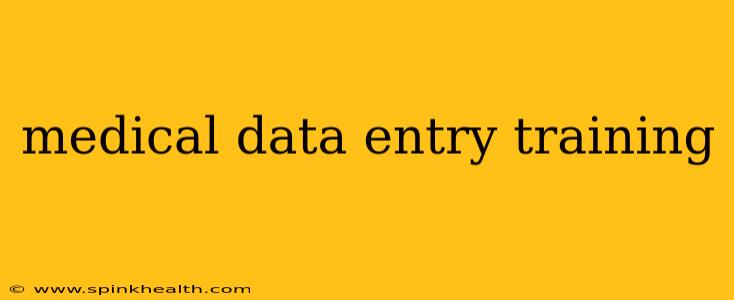The click of the keyboard, the satisfying whoosh of data seamlessly entering a medical record – this is the rhythm of a medical data entry specialist. It's a career that's not just about typing; it's about accuracy, attention to detail, and making a real difference in healthcare. But how do you get there? This guide will take you through everything you need to know about medical data entry training and launching a successful career in this vital field.
Imagine this: You're contributing to a patient's complete medical history, ensuring doctors have the information they need to provide the best possible care. Your accuracy might help prevent medication errors, facilitate smoother transitions between care settings, and ultimately, improve patient outcomes. That's the power of medical data entry, and it's a field with growing demand.
What Does Medical Data Entry Training Involve?
Medical data entry training isn't just about learning to type fast. It's a specialized skill set that demands accuracy, knowledge of medical terminology, and adherence to strict confidentiality protocols. A comprehensive training program will cover:
- Keyboarding and Typing Skills: You'll refine your typing speed and accuracy, focusing on efficient techniques for entering medical data.
- Medical Terminology: Learning the language of medicine is crucial. This includes understanding abbreviations, diagnoses, procedures, and medications. Think of it as learning a new, highly specialized language.
- Medical Coding and Billing (often included in more advanced programs): Understanding medical codes (like ICD-10 and CPT codes) is often part of more advanced training programs, and can significantly boost your career prospects.
- Electronic Health Records (EHR) Software: Proficiency in various EHR systems like Epic, Cerner, or Meditech is essential. Training often involves hands-on experience with these systems.
- Data Integrity and Accuracy: You'll learn the importance of double-checking your work, understanding data validation rules, and maintaining the highest levels of accuracy. One wrong keystroke can have significant consequences.
- HIPAA Compliance: Protecting patient privacy is paramount. You'll receive thorough training on HIPAA regulations and maintaining patient confidentiality.
- Medical Record Organization and Management: Understanding how medical records are structured and maintained is key to efficient data entry.
Where Can I Find Medical Data Entry Training?
Several avenues offer medical data entry training:
- Community Colleges and Vocational Schools: These institutions often offer certificate programs or associate degrees in medical office administration or related fields, including comprehensive medical data entry training.
- Online Courses: Numerous online platforms provide self-paced or instructor-led courses covering the necessary skills. Look for reputable sources with positive reviews.
- On-the-Job Training: Some healthcare facilities offer on-the-job training, although this often requires prior experience in an administrative role.
What are the Career Prospects After Medical Data Entry Training?
Graduates of medical data entry training programs can find opportunities in a wide variety of settings:
- Hospitals: Large and small hospitals constantly need skilled medical data entry specialists.
- Clinics: Doctor's offices and clinics also employ data entry personnel to manage patient records.
- Insurance Companies: Insurance companies require individuals to process medical claims and maintain accurate patient data.
- Healthcare IT Companies: These companies often work with EHR systems and may require trained data entry specialists.
How Much Can I Earn as a Medical Data Entry Specialist?
Salary varies based on location, experience, and additional certifications. Entry-level positions may start at a lower rate, but with experience and further training (like medical coding), your earning potential increases significantly.
Is Medical Data Entry Training Right For Me?
If you're detail-oriented, have strong typing skills, and are interested in a career in healthcare, medical data entry training might be the perfect fit. It's a career that allows you to make a direct contribution to patient care in a dynamic and growing industry.
What software programs are commonly used in medical data entry?
Commonly used EHR (Electronic Health Records) systems include Epic, Cerner, and Meditech. Many training programs will provide hands-on experience with these widely-used systems.
What certifications are available for medical data entry specialists?
While not always mandatory, certifications can boost your resume and demonstrate your commitment to the profession. Some organizations offer certifications related to medical coding, which is often a closely related field.
How long does it typically take to complete medical data entry training?
The length of training varies greatly depending on the program. Certificate programs can often be completed in a few months, while associate degrees might take two years.
This journey into the world of medical data entry is a rewarding one, offering a stable career with the potential for growth and advancement. So, take the leap, start your training, and become part of the vital support system for the healthcare industry.

